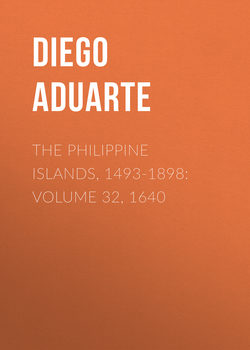Читать книгу The Philippine Islands, 1493-1898: Volume 32, 1640 - Aduarte Diego - Страница 7
History of the Dominican Province of the Holy Rosary
Chapter LXXIV
The silence, occupation, and virtues of father Fray Luis, and his happy death
Оглавление[Father Fray Luis had the three virtues which St. Ambrose, the doctor of the Church, affirms to be fundamental ones: the power to keep silence, the power to speak in due time, and the contempt for worldly things. His habit of silence seemed excessive to some, but when it was necessary he spoke with great spirit; and he so contemned worldly things that, in spite of the high offices which he held in the order, he had not even, as many good religious have, an image or any other trifling thing of his own. When he was ambassador in China, he left the rich table of Don Fernando de Castro and sustained himself, as one in poverty, by the allowance granted to the poor in China. Contrary to his nature, he was very humble. He was devout in prayer, and careful in saying the divine offices. He distributed his time with the greatest accuracy. He was most modest in the presence of women, and, though he sometimes had to speak to them, he never looked upon their faces. He was so charitable and tender-hearted that, when the judges were about to execute any rigorous sentence, they always concealed it from father Fray Luis, because they knew they could not resist his prayers for pity and pardon. He could not bear offenses against God, however willing to suffer wrongs to himself. He slept on a mat on the floor of his cell. His pillow was a piece of wood hollowed to make it light. Though the rules of the order permitted him two blankets, one to lie on and the other to cover himself with, he contented himself with one, folding it so that it would fulfil both offices. He wore his serge tunic a month without changing it, which in such a hot country causes great annoyance, because of the great amount of perspiration. He said that custom had made it not uncomfortable for him. He constantly wore a hair-shirt next his skin, and over that a corselet of mail. In his extreme old age, the bishop of Nueva Segovia compelled him to lay this last aside. He wore his breeches in such a way that the fastenings cut into the flesh of his legs. He was very sparing in his eating, giving his suppers, when the constitutions permit them to us, to the poor; and his noon allowance was more theirs than his. His lunch was two biscuit crusts and a banana, or two guavas, when there were any; and except at these times he neither ate nor drank. When he was vicar of the convent of Nueva Segovia, a father visited him as his guest, bringing with him two crawfish, which he boiled and put on the table; but father Fray Luis would not permit them to be eaten, saying it was not a feast, that they should have anything so unusual. He scourged himself every night, with the energy which was his by nature. He was most patient, and, though his body was mortified, his spirit was open to divine influences. He had great power of insight into the souls of those whom he saw. At one time he caused the bishop of Nueva Segovia, whose vicar-general he was, to dismiss two youths of his household – saying that he saw in them the marks of wickedness, and that one of them was a thief and the other a traitor. This was not known at the time, but the truth was afterwards discovered, one of them having ransacked a desk of the bishop’s and the other having been condemned to be hanged for murder. When he was engaged in contemplation, his mind was so absorbed that he could hear and see nothing else than the visions of God. This life of penitence continued from his youth to an old age of almost eighty years. In his last illness he was taken to the convent of Sancto Domingo at Manila, where he died. Testimony of miracles wrought by him during his life was given after his death. He is mentioned with honor in the records of the provincial chapter of 1612 and in the general chapter held at Bolonia in 1615.]
